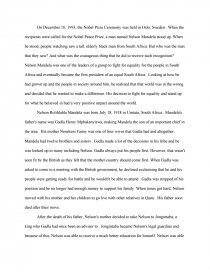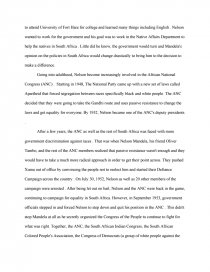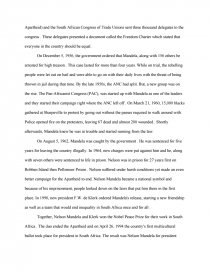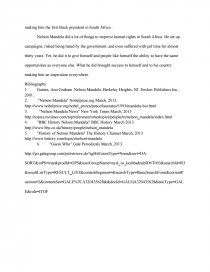Nelson Mandela Biography (chicago Format)
Essay by hs070972 • January 5, 2014 • Case Study • 1,208 Words (5 Pages) • 1,975 Views
On December 10, 1993, the Nobel Prize Ceremony was held in Oslo, Sweden . When the recipients were called for the Nobel Peace Prize, a man named Nelson Mandela stood up. When he stood, people watching saw a tall, elderly black man from South Africa. But who was the man that they saw? And what was the courageous thing that he did to receive such recognition? Nelson Mandela was one of the leaders of a group to fight for equality for the people in South Africa and eventually became the first president of an equal South Africa. Looking at how he had grown up and the people in society around him, he realized that that world was in the wrong and decided that he wanted to make a difference. His decision to fight for equality and stand up for what he believed in had a very positive impact around the world.
Nelson Rolihlahla Mandela was born July 18, 1918 in Umtata, South Africa . Mandela's father's name was Gadla Henry Mphaksnyiswa, making Mandela the son of an important chief in the area . His mother Nosekeni Fanny was one of four wives that Gadla had and altogether, Mandela had twelve brothers and sisters . Gadla made a lot of the decisions in his tribe and he was looked up to many including Nelson. Gadla always put his people first. However, that wasn't seen fit by the British as they felt that the mother country should come first. When Gadla was asked to come to a meeting with the British government, he declined exclaiming that he and his people were getting ready for battle and he wouldn't be able to attend . Gadla was stripped of his position and he no longer had enough money to support his family. When times got hard, Nelson moved with his mother and her children to go live with other relatives in Qunu . His father soon died after their move.
After the death of his father, Nelson's mother decided to take Nelson to Jongintaba, a king who Gadla had once been an advisor to . Jongintaba became Nelson's legal guardian and because of this, Nelson was able to receive a much better education for himself. Nelson was able to attend University of Fort Hare for college and learned many things including English . Nelson wanted to work for the government and his goal was to work in the Native Affairs Department to help the natives in South Africa . Little did he know, the government would turn and Mandela's opinion on the policies in South Africa would change drastically to bring him to the decision to make a difference.
Going into adulthood, Nelson become increasingly involved in the African National Congress (ANC) . Starting in 1948, The National Party came up with a new set of laws called Apartheid that forced segregation between races specifically black and white people. The ANC decided that they were going to take the Gandhi route and uses passive resistance to change the laws and get equality for everyone. By 1952, Nelson became one of the ANC's deputy presidents .
After a few years, the ANC as well as the rest of South Africa was faced with more government discrimination against races . That was when Nelson Mandela, his friend Oliver Tambo, and the rest of the ANC members realized that passive resistance wasn't enough and they would have to take a much more radical approach in order to get their point across. They pushed Xuma out of office by convincing the people not to reelect him and started their Defiance Campaign across the country . On July 30, 1952, Nelson as well as 20 other members of the campaign were arrested . After being let out on bail, Nelson and the ANC were back in the game, continuing to campaign for equality in South Africa. However, in September 1953, government officials stepped in and forced Nelson to step down and quit his position in the ANC . This didn't stop Mandela at all as he secretly organized the Congress of the People to continue to fight for what was right. Together, the ANC, the South African
...
...



